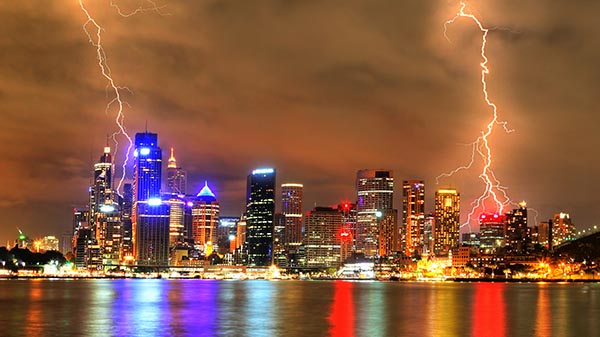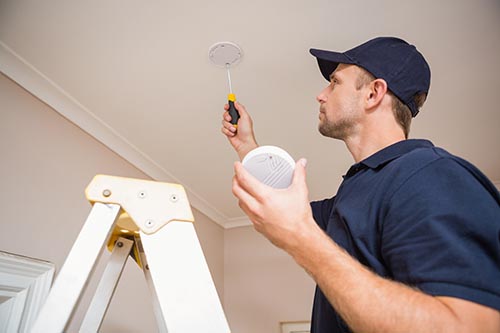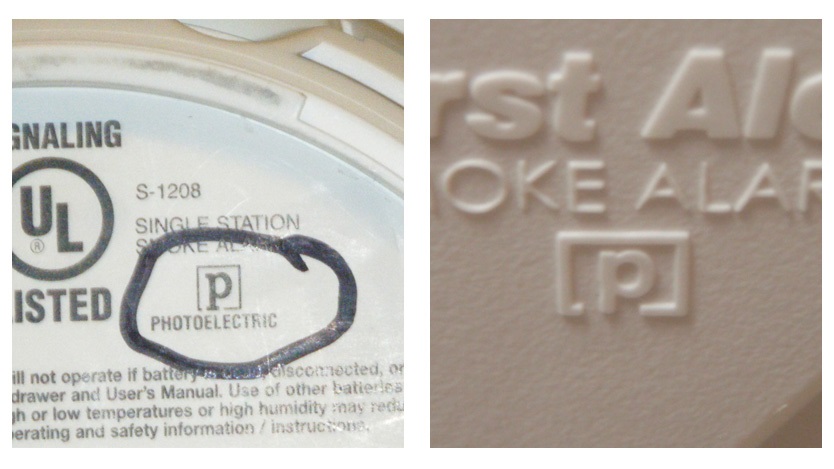As Gold Coast residents know, storm season is almost here. We’ve already started experiencing some of the impressive storms that usually build up after days of intense heat and humidity. Love ’em or hate ’em, you’ve gotta respect all that power!
Storms can be amazing experiences, but they also do amazing damage – damage that none of us can afford. Some of that damage – fallen trees, for instance, you can’t predict and usually can’t do anything in advance to protect yourself.

But you can definitely protect your family and yourself, your home and your business from electrical damage caused by those spectacular lightning strikes with which we are all so familiar here on the Gold Coast.
South East Queensland is listed by the Bureau of Meteorology as an area with the highest rating for lightning strikes throughout Australia due to its inherent location to the coastline and the backdrop of Tamborine Mountain and the McPherson Ranges.
Power surges can be a major problem, but for licensed electricians like Day/Night Emergency Electrical Service, they are just another challenge to be met, not a problem at all.
Let’s discuss surge protection
Should you unplug?
Yes – definitely. Lightning is a killer of all electronic devices. Power surges caused by lightning are huge and can cause equally huge damage to your electronic equipment. Even an indirect lightning strike near a power line can induce a power surge at high voltages which can damage your computers, TV’s, solar inverters, sound equipment and the electronic components within all your household appliances.
Our advice is to that when you hear that distant rumble of thunder, it is time to act, do the rounds of the house and unplug your equipment.
If you are away from your home then you must have surge protection devices installed in your switchboard to keep your house isolated from external influences.
But well before that (think now) you should invest in quality power surge protection. We can’t prevent power surges, but we can take practical steps to protect ourselves against them.
You can use portable surge protector boards, but that high voltage spike is only one metre away from your sensitive electronic devices.
Best practice is to install Surge Protection in your switchboard and protect the entire building by quenching the voltage spike before it enters your wiring system.
Please note, this wise investment in protection is year-round, so surges and transient voltage spikes due to damage to powerlines by car accidents or accidental digging up of power reticulation are stopped in their tracks once they reach your switchboard.

What is a power surge?
Put simply, it is a greatly increased, brief voltage spike travelling down the external powerlines towards your house. It often lasts less than a second but the results can be devastating.
Power surges during a storm are due to falling trees damaging powerlines or high wind speed which causing contact between high voltage lines and the low voltage lines which feed the residential power grid.
Your power supply company can unavoidably transmit them to your building, especially during storms but on other occasions too, usually because the flow of electricity has been interrupted and then re-started.
Insurance Cover: We suggest you check your current policy!
Most home insurance policies do not cover damage to contents by external power surges!
You can add this cover as an option but in the event of a claim you will still have to do the tedious tasks of processing the claim, paying the excess and then arranging replacement of your equipment which may have been tailored/selected to fit design furnishings or cabinetry.
Please note that a direct lightning strike to your property will most likely cause damage to your home and contents.
Again, check your insurance to see the extent of your cover.
Trust us, it will be cheaper in the first instance to arrange a surge protection system for your home.
What is Surge Protection?
Surge protectors come in different forms but they all serve the same purpose. When installed correctly, surge protectors safely divert the path of an electrical surge to earth and allow the high levels of energy to safely be disbursed.
The most basic layer of protection requires that a licensed electrician install a whole home surge arrester at your electrical panel or meter.
Depending on the scope and complexity of the equipment through your home, Day/Night can tailor design a system which can offer the highest forms of protection from external influences.
When we fail to prepare, we prepare to fail. As trite as that sounds, it’s just true. The importance of installing surge protection may be the last thing on your mind, but on the Gold Coast it truly is a no-brainer.
If you’re ready to explore surge protection options for your home or want to do a general safety inspection to ensure your home is ready for any major weather events, pick up the phone or email us so we can discuss how to better protect your investments.
Call us now on 07 5554 2200 or simply fill out the form on our contact page.
We wish you a safe, ‘Surge Free’ Gold Coast storm season!





